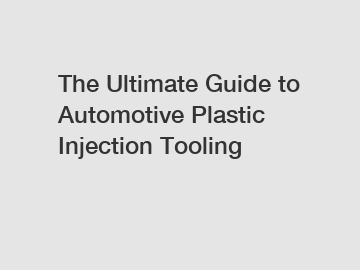The Ultimate Guide to Automotive Plastic Injection Tooling
The Ultimate Guide to Automotive Plastic Injection Tooling.
Automotive plastic injection tooling is a critical component of the manufacturing process in the automotive industry. It plays a crucial role in shaping and molding plastic components that are used in various automotive applications. In this guide, we will provide a comprehensive overview of automotive plastic injection tooling, explaining its origins, the process of obtaining it, and its significance and impact on the industry.
Origins of Automotive Plastic Injection Tooling.

The origins of automotive plastic injection tooling can be traced back to the early days of the automotive industry. As vehicles became more intricate and complex, the need for lightweight and durable plastic components grew. Traditional manufacturing processes were unable to cater to this demand effectively. Hence, the advent of plastic injection molding revolutionized the industry.
The Process of Obtaining Automotive Plastic Injection Tooling.
The process of obtaining automotive plastic injection tooling involves several stages. Firstly, a detailed analysis of the part requirements is conducted, which includes identifying the material, dimensions, and surface finish. Once this is determined, the tooling design phase begins. This phase involves the creation of a precise 3D model, which serves as the basis for the tooling. After the design is finalized, the tooling is manufactured using CNC machining or 3D printing techniques. Finally, the tooling undergoes rigorous testing and debugging to ensure its functionality and quality.
Significance and Impact of Automotive Plastic Injection Tooling.
Automotive plastic injection tooling has a significant impact on the industry for several reasons. Firstly, it enables the mass production of plastic components with consistent quality and precision. This, in turn, reduces costs and increases efficiency, as the manufacturing process becomes streamlined. Additionally, plastic injection tooling allows for the creation of complex shapes and intricate designs that are not feasible with traditional manufacturing methods.
Moreover, the use of plastic injection tooling has led to significant advancements in the automotive industry. Lightweight plastic components have replaced heavy metal parts, resulting in improved fuel efficiency and reduced emissions. Furthermore, the ability to incorporate additional functionalities, such as integrated sensors or electronics, has enhanced the overall performance and functionality of vehicles.
In conclusion, automotive plastic injection tooling is an essential aspect of the manufacturing process in the automotive industry. Its origins can be traced back to the need for lightweight and durable plastic components. The process of obtaining tooling involves thorough analysis, design, manufacturing, and testing. The significance of automotive plastic injection tooling lies in its ability to enable mass production, reduce costs, and facilitate the creation of complex designs. Additionally, the impact of tooling can be seen in the advancements it has brought to the industry, such as improved fuel efficiency and enhanced functionality. By understanding the ultimate guide to automotive plastic injection tooling, manufacturers can leverage this technology to stay competitive and innovate in the ever-evolving automotive market.
For more oem low volume plastic parts, oem custom mold services supplier, oem injection molding prototyping factoryinformation, please contact us. We will provide professional answers.
157
0
0

Comments
All Comments (0)